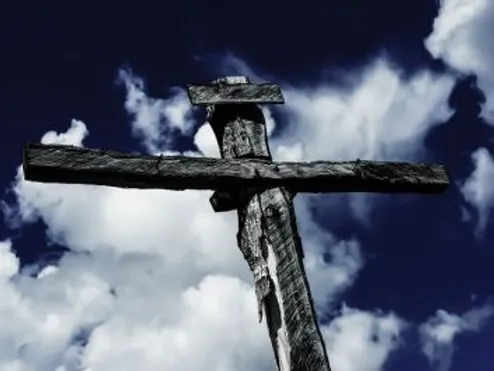Why does this symbol cause “all hell to break loose?”
A middle school student is prohibited from wearing a cross necklace, a gift from her grandmother.
A university buys a church building. Before any other renovation, the cross is removed.
A city council removes a small cross from a church on the city’s seal to avoid offending anyone except those offended by its removal.
Around the globe, the stories become more severe: churches burned, homes destroyed, people displaced, abducted, sold into slavery, arrested, beheaded, crucified, and worse.
What is it that is so offensive?
Jesus endured the cross, dying a criminal’s death, but the offense is not in his death. Crucifixion was one of the worst forms of punishment imposed by the Roman authority. Many people were killed on Roman crosses, but Jesus’ crucifixion was different.
He was crucified because the Jewish court accused him of blasphemy, of claiming that he was the Son of God, and they handed him over to the Roman governor and called for his death by crucifixion.
Others had made similar claims and collected followers, but when they lost heart, died, or were killed, their followers dispersed.
What was different about Jesus? What did he do to render the cross so offensive?
He rose from the dead.
He not only rose from the dead, but in his death, he took upon himself the punishment for the wrongs and shortcomings of all humanity.
A carpenter from Nazareth claimed to be our salvation, the divine son of God.
The cross defies self-reliance. The cross claims that there is objective truth, that humanity did not create itself, that humans need saving, that we are fallible, that we fall short of a divine expectation.
The cross rocks our world with the exclusive claim that we cannot save ourselves, no amount of doing good can save us, no one else can save us, only the divine sacrifice of the crucified Christ can save us, that we are lost and in desperate need of saving.
But there is a strange dichotomy. The cross is both exclusive AND inclusive. God loved the world so much that He sent His Son, the firstborn of all creation to die for us, becoming the firstborn from the dead. He became human and conquered death, so that we can conquer death as well.
Those are fighting words to some who do not believe.
But why?
If the claims are true, we had all better pay attention, but if they’re not, then let it go.
Right?
It’s never that easy.
The cross stands tall even when it’s cut down. The cross is a stubborn symbol. It doesn’t go away. It goads the hostile soul, taunting the disbelieving. It weathers all storms. It stands against rationalization, denial, dismissal. It does not go away. It does not retreat. The cross
endures, survives, and thrives.
The words of the hymn still ring true.
The Old Rugged Cross
On a hill far away stood an old rugged cross,
The emblem of suffering and shame;
And I love that old cross where the Dearest and Best
For a world of lost sinners was slain.
Refrain:
So I’ll cherish the old rugged cross,
‘Til my trophies at last I lay down;
I will cling to the old rugged cross,
And exchange it someday for a crown.
Oh, that old rugged cross, so despised by the world,
Has a wondrous attraction for me;
For the dear Lamb of God left His glory above
To bear it to dark Calvary.
In that old rugged cross, stained with blood so divine,
A wondrous beauty I see,
For ’twas on that old cross Jesus suffered and died,
To pardon and sanctify me.
To the old rugged cross I will ever be true;
Its shame and reproach gladly bear;
Then He’ll call me someday to my home far away,
Where His glory forever I’ll share.
To the believer, nothing else matters. Christ left everything on that cross:
all our shame, all our mistakes,
all our offenses, every crime,
every ill thought. He took it all upon Himself, and He nailed it to that cross. What offends so many is transforming to the ones who cling to everything it stands for. The ancient tool that men meant for death, God used to bring life.
I wrote these words on the day that pastor Saeed Abedini was released from prison as I consider all he has endured for the offense of the cross.
To the old rugged cross I will ever be true;
Its shame and reproach gladly bear.

